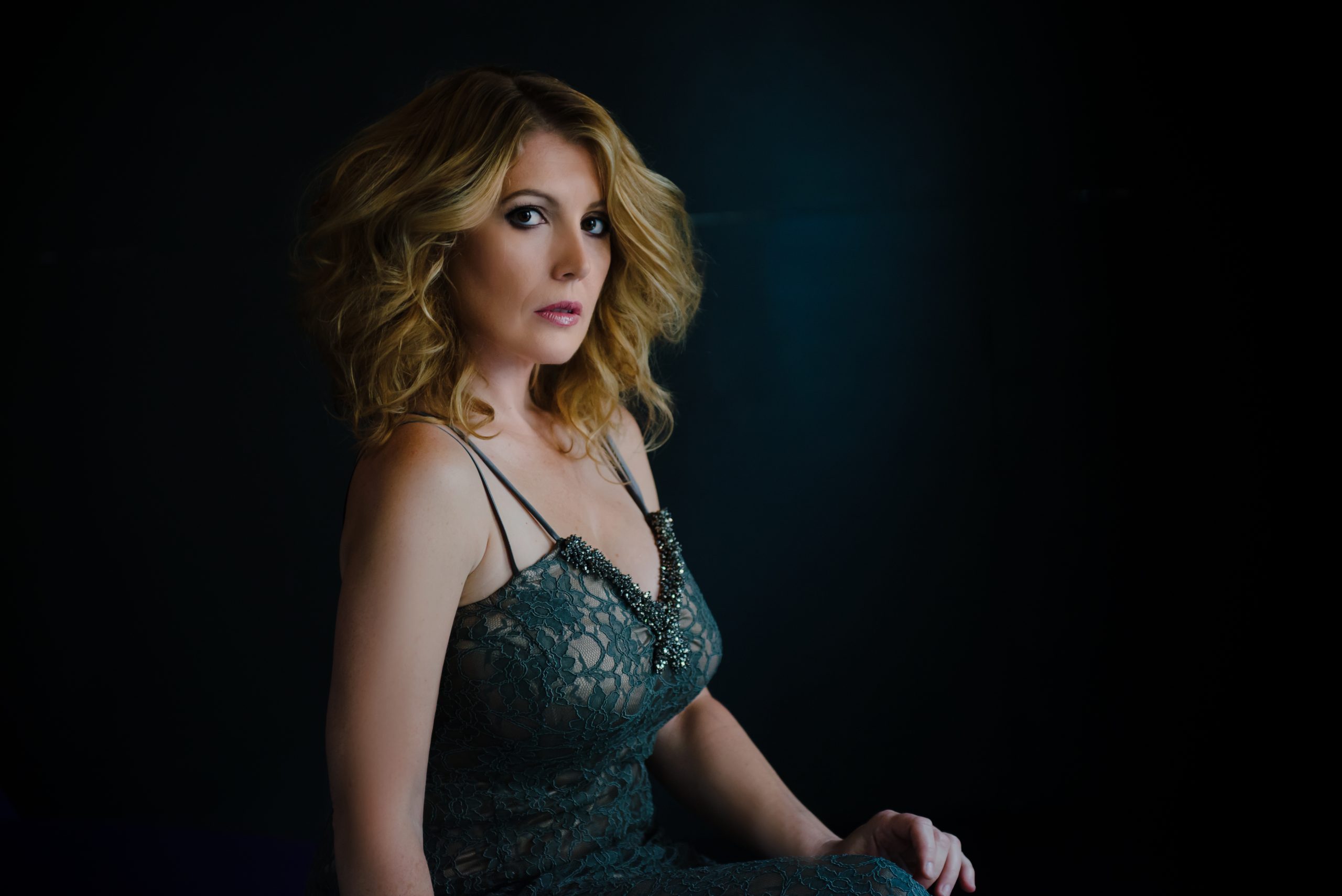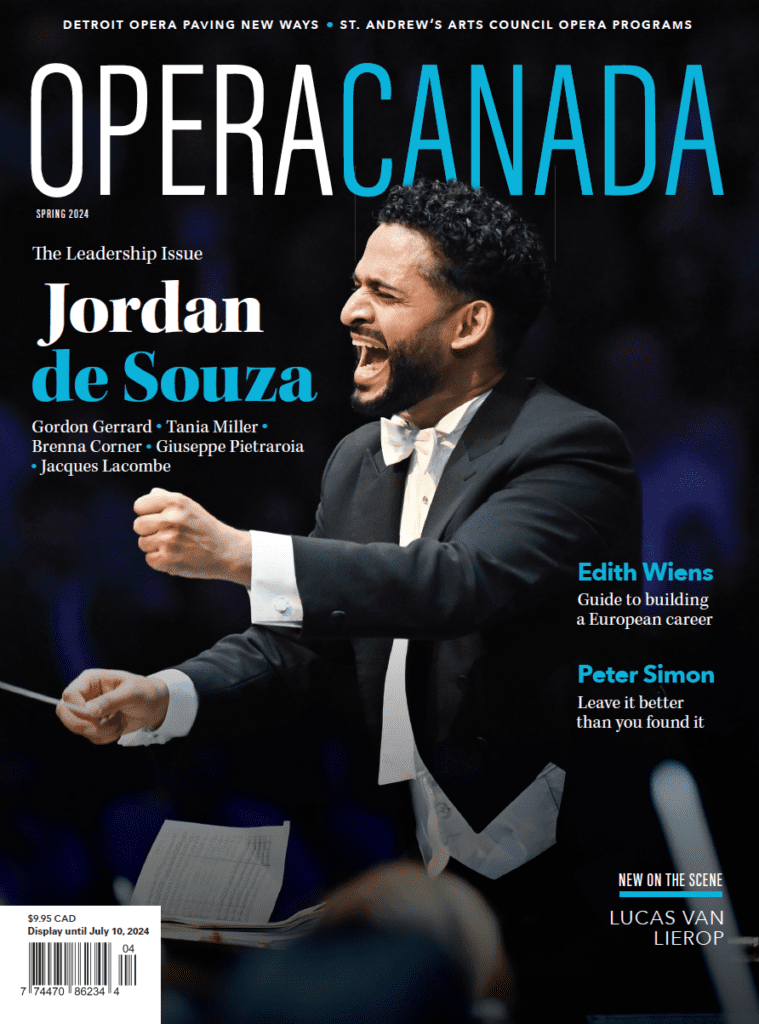Canadian mezzo Krisztina Szabó shares her thoughts on singing Judith, teaching and maintaining a healthy work-life balance.
In a profession known for its impermanence, where even the most gifted artists can shine brightly for a while and then disappear without a trace, mezzo Krisztina Szabó’s career remains as bright as ever. Since her professional debut as a Canadian Opera Company Ensemble Studio member in 1998, it’s been an enviable career of nearly a quarter-century. I heard her at the outset, and it was clear even then that she had the ingredients for success—a beautiful high mezzo with excellent upper extension, solid technique, uncommon musicality, and a lovely stage presence.
Now 24 years later, Szabó is still in her vocal prime. In addition to a busy singing schedule, she’s now Assistant Professor of Voice at the University of British Columbia, imparting her wisdom to the next generation of singers. Despite a pandemic that has silenced opera houses and concert halls, Szabó continued to work between teaching, pivoting to many virtual projects, including Atom Egoyan’s production of Béla Bartók’s Bluebeard’s Castle for the COC.
Digitally recorded last January, the Bartók contract came at a particularly difficult time: “The week we recorded the performances, my mother was diagnosed with an inoperable brain cancer. The moment I finished the recording, I received a call from my husband that she was in hospital. That whole week, her health had taken a turn, so singing in Hungarian, the language of my parents—one already gone and one declining rapidly—felt very poignant indeed. In my heart, I dedicated this Bluebeard performance to her.”
Despite her sadness, Szabó carried on with the strong work ethic inherited from her parents. Work is therapeutic, and a way of honouring those who nurtured her. With many venues opening up again, she sang in Orfeo ed Eurydice, plus concert dates such as a Bach B Minor Mass in Vancouver this Easter Sunday. She can also be heard as a featured performer on the latest Canadian Art Song Project CD release: Found Frozen: Songs of Jeffrey Ryan (Centrediscs: 30222).
Opera Canada caught up with her by Zoom, in a wide-ranging, heartfelt chat on her voice, her career and her life.
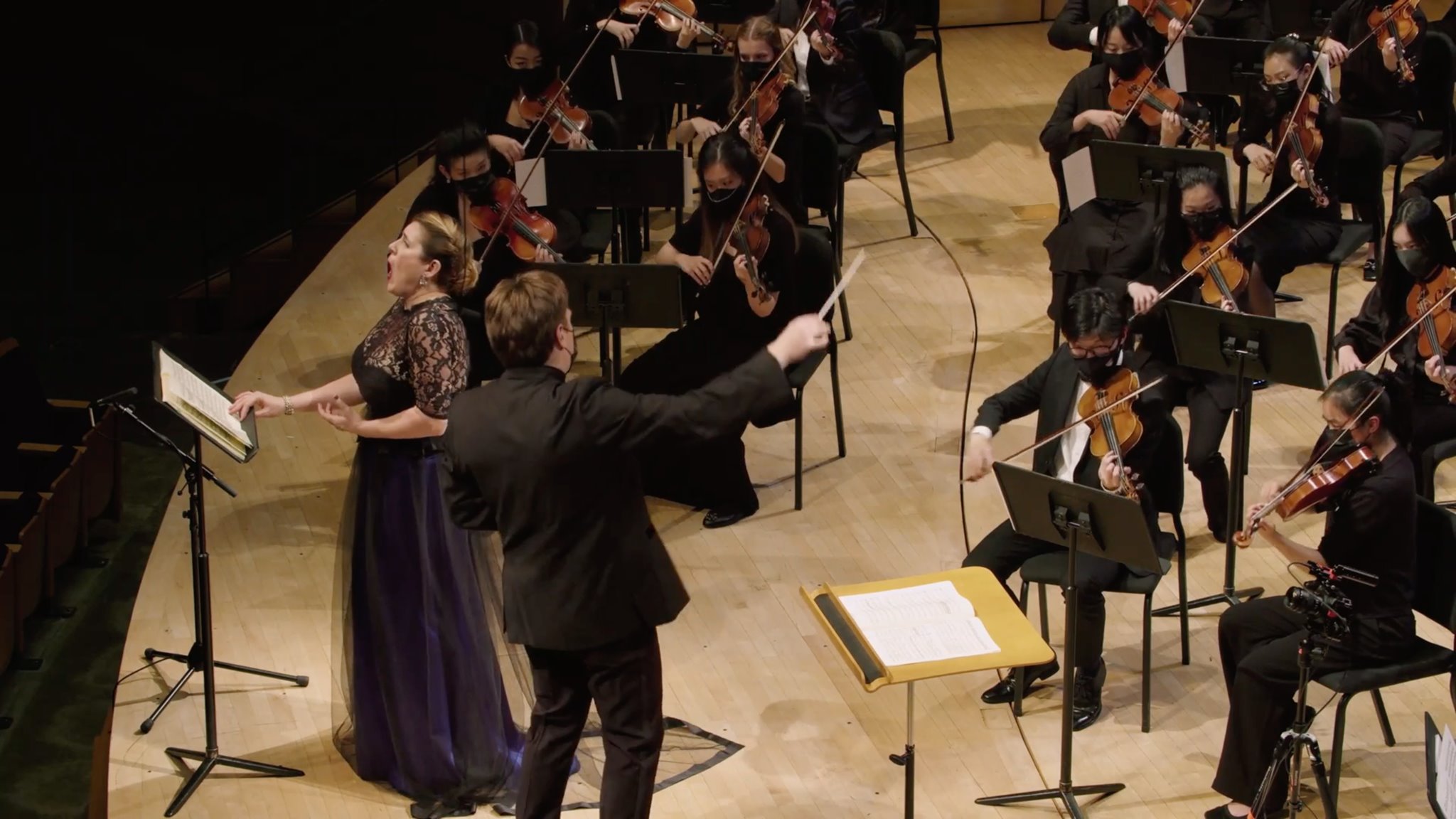
Krisztina Szabó singing with the UBC Symphony Orchestra, conducted by Jonathan Girard. Photo: Courtesy Krisztina Szabó
OC: You have been at UBC for almost two years now, so tell us, how do you like teaching?
KS: Actually, I had been teaching before UBC. I was a sessional faculty member at the University of Toronto for seven years. I had a very small studio since I was still performing and teaching around my gigs. It was nice, dipping my toe in the water of teaching, a wonderful opportunity to work with young singers. So, when the UBC position was advertised, I was reached out to by others to apply. Moving across the country to UBC was not on my radar! If it hadn’t been for the pandemic, I might not have considered it, because I was very busy singing. But then the pandemic hit, and everything just sort of went away like water, it made me more open to the possibility of teaching.
OC: Is it a tenure track position?
KS: Yes. I’m very excited and it’s a wonderful opportunity. As you know, to achieve tenure, professors are required to do research. For me as a performer, my research is my performing. I’m expected to continue to sing, so I have the best of both worlds.
OC: The pandemic has really dealt a terrible blow to the performing arts. How do you see the future?
KS: It’s been very tough. That first spring of watching everything just disappear was disheartening and terrifying. CERB helped. Then I started to see innovation almost immediately, people pivoting, being extremely creative in how to share their craft. Companies also pivoted to other ways to continue to make art. There were opportunities, people working very hard to keep it going. What will it look like going forward? I wish I had a crystal ball! I don’t know. I feel we need much more support for the performing arts at the government level. I’d like to see more of a recognition of how important the arts are in society.

Left to right: Mireille Lebel (Orfeo) and Krisztina Szabó (Euridice) in Vancouver Opera’s Orfeo ed Euridice. Photo: Tim Matheson
OC: You recently sang Orfeo ed Euridice. Was it in-person?
KS: Yes, it was, sold at 50% capacity. I think that was what was allowed at the time, and it sold out. But it was only two shows. The buzz in the theatre, a live performance…it was just incredible. People were thrilled to be back, and participating in the energy of a live performance, I’m hoping that will continue.
OC: Let’s talk about Bluebeard Castle. Was the performance taped?
KS: It was taped in mid-February. We were supposed to tape in January, then Omicron hit. The orchestra was taped first, we recorded later, basically listening to the audio of the orchestra. We rehearsed all through January just as we would have done.
OC: Did you sing it in a studio, or were you on the stage of the COC’s Four Seasons Centre?
KS: We were on the stage. We had those little microphones over our ears. I had been doing a lot of projects digitally, singing to empty houses. It’s a different energy…more internal, kind of like a recording process. But because I’m interacting with my colleague, it feels like we’re in an intense drama, just the two of us together. I know there’s no audience, but it’s such a stunning house…looking out at that beautiful house is always a gift.
OC: The libretto is in Hungarian. Do you speak Hungarian?
KS: I grew up speaking Hungarian. My parents were both immigrants. Then my paternal grandmother moved from Hungary to Canada just before I was born. She was very stubborn and never learned English, so we spoke Hungarian in the house. My parents sent me to heritage language classes, where I did four hours of Hungarian every Saturday. And on top of that, I did some Hungarian folk dancing…so I was immersed.
OC: Do you still have family or relatives in Hungary?
KS: I do. My grandparents are gone, my uncles are gone. I do have a lot of extended family, and we keep in loose contact. So yeah, it was a big family.
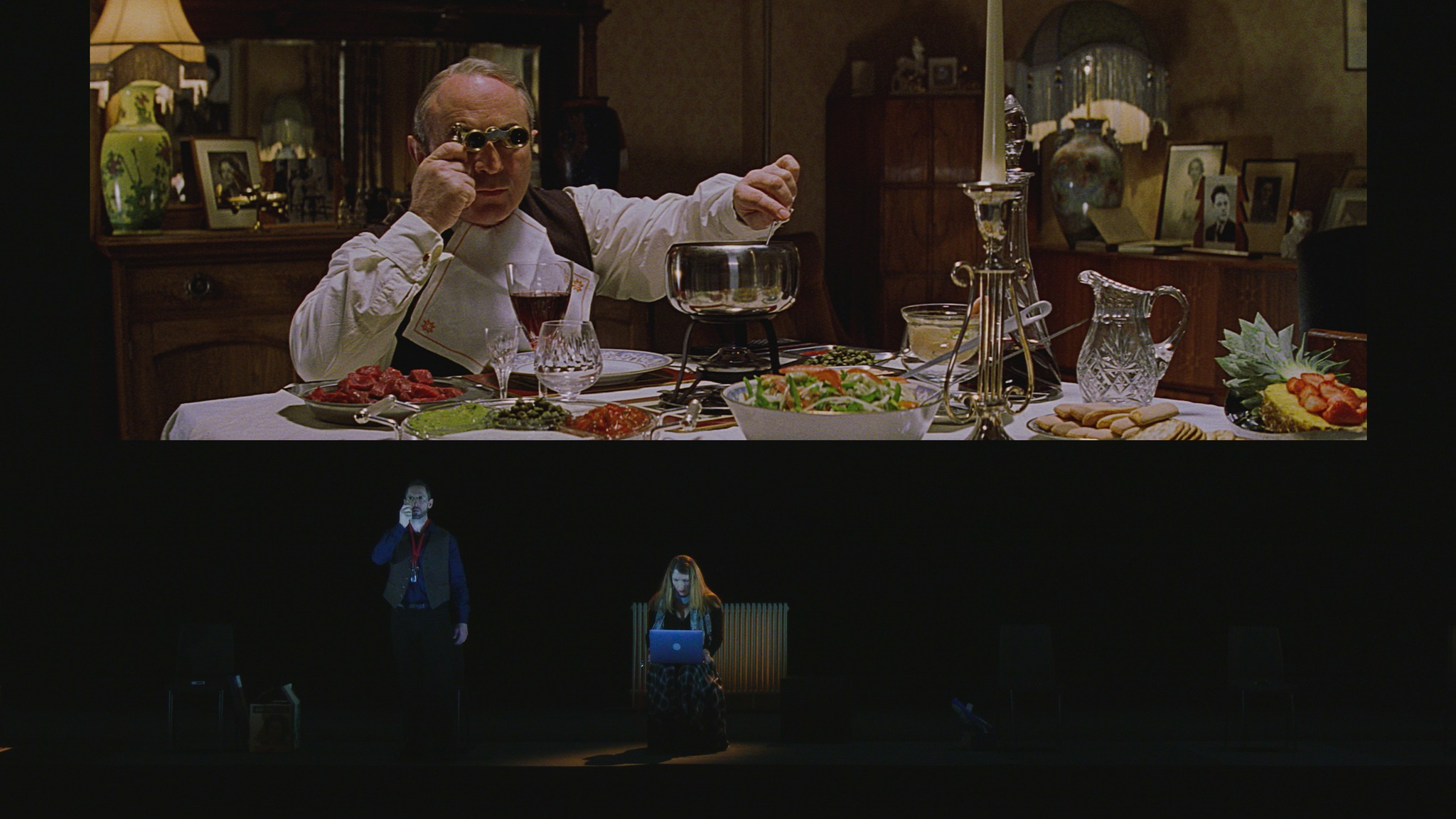
(Top screen): Bob Hoskins in the movie, Felicia’s Journey; (lower screen) Kyle Ketelsen (Bluebeard) and Krisztina Szabó (Judith) in Atom Egoyan’s Bluebeard’s Castle for the Canadian Opera Company. Photo: COC
OC: You’ve mentioned that you love the role of Judith. Where have you sung her? Do give us your thoughts on Bartók, Bluebeard and Judith.
KS: I covered Judith twice at the COC, and I’ve sung it at the Chicago Opera Theater with Samuel Ramey singing Bluebeard. I also sang it in Colorado, at a summer festival in concert. I’ve done it a bunch. First and foremost, singing in a language that I speak is really a gift. It connects me to my culture, so that there’s an emotional link. There’s also the immersion in the folksong tradition, which I had the opportunity to explore when I was singing it with a Hungarian conductor, and the Bluebeard was also Hungarian. They really educated me on how much the folk song tradition infuses the piece, deepening my understanding. I love to sing Judith. On the surface it seems that she’s a weak woman, being dragged around by this guy, but she’s constantly the one leading. I was reading an interpretation where each door is a key to discovering something about herself, a psychological discovery. Each door is so different musically and dramatically.
OC: Atom Egoyan has his own distinctive take on the opera, doesn’t he?
KS: What he imparted to us was that his movie, Felicia’s Journey, was inspired by the Bluebeard story. In the ritual meeting between Bluebeard and Judith, there are new things that he brings into the story—for example, the poison, which Bluebeard drinks at the end.
But in terms of Judith, I have never thought of her as a victim. Because of the strong language she uses in the opera—she wants this, she’s asking, she’s demanding, she wants the damned keys! He’s the reluctant one. He doesn’t want to open the doors. In this production, a choice is made. He drinks the poison, and I’m like, “No thanks, I’m out!” Judith walks away. He’s the one who dies.
OC: Is the role challenging to sing?
KS: It’s not a taxing opera. It is about an hour in length, and in terms of my singing, it’s very short. It’s also not so challenging in terms of range; it’s more about volume. Bartók was not so kind in that it’s a massive orchestra. You need a very sensitive conductor for balance. And if the set is not singer-friendly, for example, with a lot of curtains, you’ll need to project your voice over the orchestra.
OC: You have a very wide repertoire, from Baroque to contemporary, and some roles that are usually sung by a soprano. I’ve always admired your high register, so I’ve sometimes wondered whether you aren’t really a soprano.
KS: That’s something that was up for debate, especially when I was in the COC as a young artist. I have played with soprano repertoire… I’ve done Donna Elvira. I’ve done Contessa. I know Elvira is scored for soprano. Do I want to live in the soprano range? No, I do not! At the time, it was a bit of an identity crisis —Who am I? What am I? My teacher said: “Krisztina, sometimes it’s just a choice.” And I thought, “Yeah, I don’t want to be a soprano. I like my middle register. I’m happy. The mezzo repertoire, personality-wise, suits me more.” I’ll continue to dabble when people let me, but I’m happy to stay where I am.
OC: You have amassed a tremendous number of performances over the years. How have you maintained a work-life balance between your career and your family?
KS: It’s hard. There’s a reason we only have one child. As a woman in this business, one child is definitely more manageable than having multiple children. You’ll find, for the most part, female performers have fewer children. Male performers have multiple children because when they go away, their wives will carry the load. I had a lot of help from my parents in the early years. And I have a very understanding husband!
My husband Kristian [Clarke] is Executive Director of the Dancer Transition Resource Centre, so he’s in arts administration and understands the artistic life. He’s not himself an artist, but he values the arts and he values what I do. I couldn’t do this without him. There were times when my daughter [Phoibe, now 16] needed me and I hadn’t been there… that was really hard. I kept thinking, “I am doing something I love, and I value what I do.”
It’s been hard work! This business is extremely fickle; there are no guarantees. I do not want to live in regret, not having done something that is important to me. And having a family is extremely important to me. It was terrifying—I’m not going to lie. When I got pregnant, I thought I was never going to work again. But I did. And now I see many more women having a career and having kids.
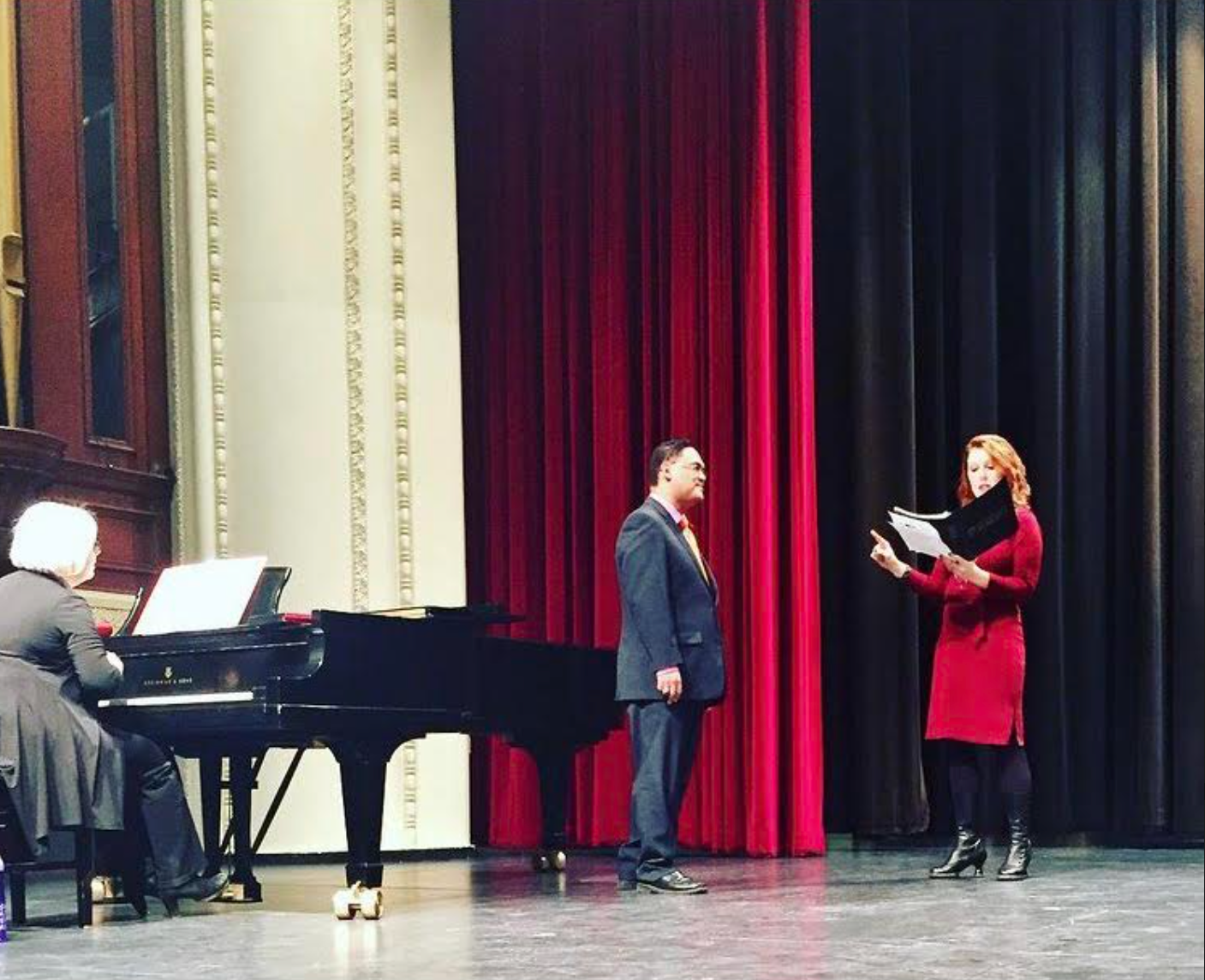
Krisztina Szabó guest teaching at the University of Alberta, Feb 2017. Photo: Courtesy Krisztina Szabó
OC: Do you find teaching as fulfilling as singing and being on stage?
KS: To be honest, some days I find it more fulfilling. There’s nothing more fulfilling than helping a singer, helping them figure something out to sing better. It’s as if I’ve contributed to someone else’s life, which feels so meaningful. It’s exciting to watch their development. For me, it’s a different kind of fulfillment, very satisfying on a human level.
OC: What do you look for in a student?
KS: I’m interested in a student who wants to make music, to find her or his authentic sound, their authentic expression as an artist. Whether or not they have a career does not matter at all. I like working with people who are curious, who are excited by making music, about the process of singing. That’s exciting to me. I don’t need them to go off and have a career. But it’s obviously fun when my students are performing and are doing well.
OC: If a student says, “I want to be an opera singer,” what would you say?
KS: The first thing is, “If you can do anything else, then do it!” It is not an easy life. Be ready to work. It’s going to be hard, especially in Canada where we don’t have the network of support. If you love it, then give it a shot, but be prepared for a roller coaster life. I would say, “Go where things flow.” Cast a wide net and see where it leads you, but also know who you are as an artist.
OC: Who are some of your teachers and mentors?
KS: I’ve been very lucky in that I’ve only had a couple of teachers in my life, and I have a team that I trust. I think for any voice professional, you have to have a team of ears that you trust. Darryl Edwards is definitely my biggest mentor. We’re still in regular contact. He’s the person I trust the most. Jean Ashworth Bartle in the early years. She was the founder of the Toronto Children’s Chorus where I sang for six years. Then Elise Bradley, who took over. They’ve been very supportive of me.
OC: What’s the best piece of advice you have been given to guide you?
KS: I guess the advice I mentioned earlier when I was having that crisis of, “Who am I, a mezzo or soprano?” Darryl said to me, “Sometimes, it’s just a choice.” So, when I’m feeling a struggle over whether something is right for me, whether I should be doing something, whether I’m on the right path, I remember, “Sometimes, it’s just a choice.” You can take either path, and both might be right. You just have to choose. That advice has definitely stayed with me.
And my parents always said, “Never get a big head.” I pride myself on being down to earth, on being grounded. I think who I want to be as an artist has always been based on who I am as an authentic person.
Watch Canadian Opera Company’s Bluebeard online until Sept 24.
Opera Canada depends on the generous contributions of its supporters to bring readers outstanding, in-depth coverage of opera in Canada and beyond. Please consider subscribing or donating today.
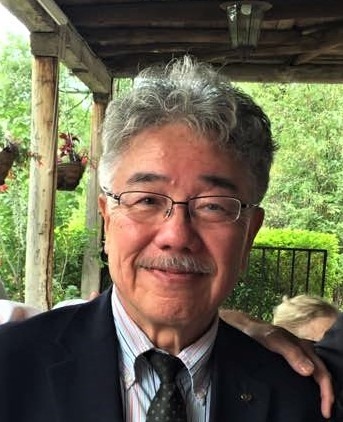
Joseph So is Professor Emeritus at Trent University. He is also a long-time contributor to La Scena Musicale and Opera (London, UK). His interest in music journalism focuses on voice, opera as well as symphonic and piano repertoires. He appears regularly as a panel member of the Big Canadian Opera Company Podcast. He has co-edited a book, Opera in a Multicultural World: Coloniality, Culture, Performance, published by Routledge (Taylor & Francis Group).

